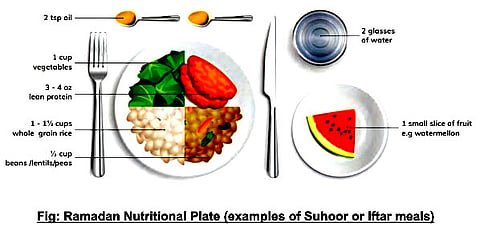
- Home
- Live Blog
- Breaking News
- Top Headlines
- Cities
- NE News
- Sentinel Media
- Sports
- Education
- Jobs

Dr. Navin Kr Bansal
(MD Medicine, Diabetologist)
Ramadan is a very important time of year for Muslims around the world,
and fasting during Ramadan is considered to be one of the five pillars of Islam. Despite being exempted, many people with diabetes, especially pregnant women and elderly people, still participate in fasting during Ramadan. But it is important to ensure that people who are living with diabetes consult their treating doctor before they fast.
Risks of fasting during Ramadan for people with diabetes:
Fasting during the month of Ramadan can be dangerous if you have diabetes, as it can cause some serious health problems. It can precipitate dramatic changes in meal schedules, fluid intake, sleep patterns, and circadian rhythms. This leads to an increase in glucose variability and, therefore, an increased risk of both hypoglycemia (low sugar) and hyperglycemia (high sugar). It can also lead to dehydration, kidney problems, heart disorders, strokes, etc.
Benefits of fasting during Ramadan for people with diabetes:
Fasting during Ramadan may also provide many benefits. It can provide an opportunity for a better lifestyle, weight loss, and smoking cessation. It also leads to improvements in fatty liver disease, blood pressure, and blood cholesterol levels. It leads to improvements in self-sufficiency, self-acceptance, social relations, and personal growth.
Diet and fluid plan: Suhoor (predawn meal): It’s important not to skip the suhoor meal, which is just before dawn. It should be taken as late as possible. You can consume high-fibre, starchy foods like oats or brown rice. Lentils (dal) and beans are good sources of protein and are also high in fiber. They can be paired with fruits and vegetables, as this will help you manage your blood sugar levels while you are fasting. Before starting the day’s fast, you should drink enough water and sugar-free fluids to avoid dehydration during the day.
Iftar meal (breaking of fast): Traditionally, the fast is to be broken with dates. But diabetic patients should limit the number of dates to one or break the fast with a glass of water. Try to rehydrate with sugar-free fluids. Water is the best option. Avoid sugary fizzy drinks, canned juices, fruit juices, tea, and coffee, as these will raise your blood sugar and make you feel more thirsty and dehydrated. Milk drinks such as lassi or laban are a good source of protein and calcium, but they should be taken without sugar or honey.
Avoid sweets such as baklava, barfi, or rasmali, as they are very high in fat and sugar. Try to avoid fried and oily foods like samosa and pakora, as eating them could lead to unintentional weight gain. These foods can also affect your heart, as they tend to increase your blood cholesterol and blood pressure above healthy levels.
When should one break the fast?
All people with diabetes who are fasting during Ramadan should break their fast if:
l Blood glucose <70 mg/dl or >300 mg/dL
l Symptoms of hypoglycemia (sweating, tremors, palpitations, dizziness) or hyperglycemia (extreme thirst, hunger, pain in the abdomen, vomiting, frequent urination)
l Dehydrationoracuteillnesslikefever, diarrhoea,vomiting
Exercise during Ramadan:
Individuals with diabetes who are fasting should be encouraged to carry out their normal physical activity. They should participate in Taraweeh prayers, which involve activities such as bowing, kneeling, and rising. Rigorous exercise or activity during the fasting period should be avoided, as this can increase the risk of hypoglycemia and dehydration, especially during the last few hours of fasting. They can be advised to do light exercise after breaking the fast.
Blood glucose monitoring:
Diabetic patients should monitor their blood sugar levels several times a day, especially if they are on insulin. Pre-iftar sugar levels can be taken as fasting blood sugar (FBS), and post-iftar meal sugar levels can be taken as postprandial blood sugar (PPBS).
Insulin and medications
All diabetic patients who wish to fast during Ramadan should consult their doctor prior to fasting. So that the insulin dose and the medicines can be adjusted to prevent fluctuations in blood sugar levels.
Myth vs. Fact
One of the biggest myths is that pricking the skin to check blood sugar breaks the fast. Also manybelievethatinjectinginsulininvalidatestheirfast. It is very important for them to understand that injecting insulin or checking blood sugar does not break the fast. In fact, it is very important for diabetic patients to check their blood sugar regularly during the fast.
So people living with diabetes should follow their doctor’s advice during Ramadan and remember the Quranic injunction: “Let not your own hands throw you into destruction.”.